There is a great deal of buzz about supposed differences in America's younger generation of workers that can make them more challenging -- or at least different -- to manage than their older colleagues. The National Oceanic and Atmospheric Administration (NOAA) Web site actually details the specific personality traits of Generation Xers (roughly 25 to 38 years of age) and lists tips for communicating with them that include: "talk in short sound bites to keep their attention." Generation Y (roughly 8- to 25-year-olds) is supposedly Gen X on Internet speed.
The broader themes running through some theories about young workers are that they resist hierarchy, thrive on flexibility in their work environment, demand constant feedback on their performance, and show little organizational loyalty. But when it comes to these theories, a healthy dose of skepticism is in order. Fortunately, survey data provide the basis for some objective analysis.
Gallup's annual Work and Education surveys* include several measures of employees' work-related attitudes. Focusing on the 18- to-29 age group as composed of Gen Y and younger Gen X workers, the data offer little to distinguish them from workers in the 30-to-49 and 50-and-older age categories.
Are younger workers less likely to feel loyal to their employers? Not according to what they tell Gallup. More than four in five 18- to 29-year-old workers report having a strong sense of loyalty to their companies. This is right in line with the attitudes of those in the middle and older age brackets.
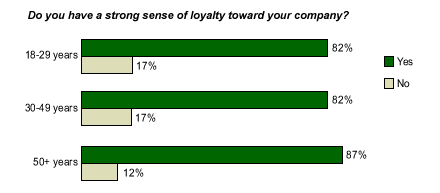
Are younger workers more resistant to being managed? If so, one would expect to find greater friction in the relationship between them and their supervisors, but that does not seem to be the case. In fact, 18- to 29-year-olds are at least as satisfied with their supervisors as are older workers, if not more so.
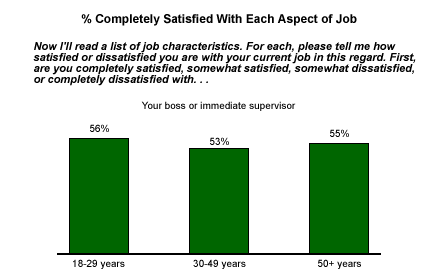
Are young workers a needy lot, always clamoring for praise and attention? The poll does not measure how much praise workers receive, but at least in terms of their response to this variable, younger workers are the most content. Just under half say they are satisfied with the recognition they receive for their accomplishments -- similar to the figures for the two older age categories.
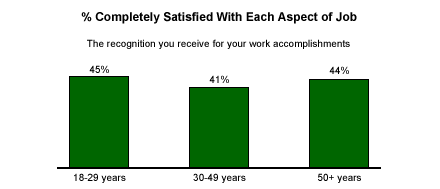
Despite the stereotype that younger workers are more interested in making time for the gym than working late, this group reports an average of more than 40 hours a week at work, similar to the time reported by older workers.

Young workers are also about as likely to be satisfied with the amount of vacation time they receive and the flexibility of their hours as are workers between the ages of 30 and 49, although older workers are slightly more satisfied on these measures (presumably because they get more vacation time each year due to their seniority). Young workers show a slight edge in satisfaction with the amount of work that is required of them.
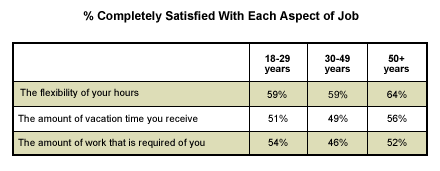
At the same time, young workers are relatively tolerant of the level of stress they encounter at work -- expressing the same level of satisfaction with stress as workers aged 50 and older, and greater satisfaction than workers aged 30 to 49.
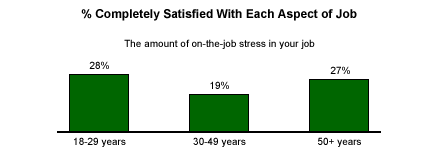
Young workers' satisfaction with their retirement and health insurance benefits is also consistent with older workers, suggesting that this generation is no more likely than anyone else to be griping to their supervisors about these issues.
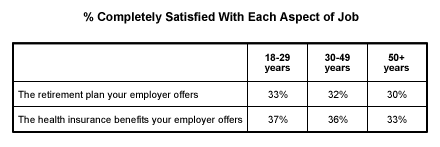
According to the survey, there are only two areas in which young workers trail older workers in traits an employer might hope for. Young employees are slightly less likely to be satisfied with their current pay than older workers are. However, this is almost to be expected given that, on average, they are also bringing home a smaller paycheck.
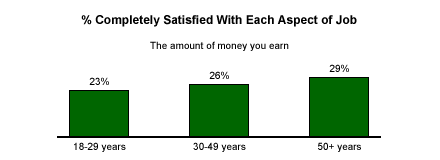
Secondly, 18- to 29-year-olds are slightly less likely than older workers to say they get a sense of identity from their job. But, then, it seems only natural that younger workers would be less likely to have derived a sense of identify from their jobs, given that they've had less time on the job to develop those feelings.
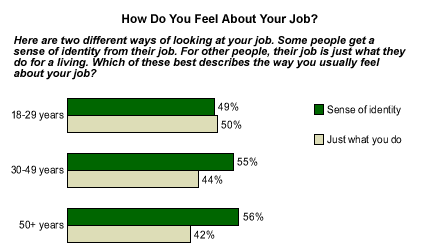
Bottom Line
Growing up playing video games and surfing the Internet may give young workers a technological edge over senior workers, but whether the entire office culture needs to be turned upside down to accommodate this group is far from clear. Gallup's annual work survey offers no support for generational stereotypes about young workers that are advanced in some business management literature. Young workers seem just as committed as older workers to their workplace, appear to have positive relationships on the job, and have no worse than typical complaints about their stress, workload, or benefits.
*Data are based on a combination of three Gallup Polls, each of approximately 580 adults aged 18 and older who are employed full time or part time. Interviewing dates were Aug. 4-6, 2003, Aug. 5-8, 2002, and Aug. 16-19, 2003.
For the total sample of 1,754 employed national adults, the maximum margin of error attributable to sampling is ±3 percentage points. For the sample of 316 young workers (aged 18 to 29), the maximum margin of error attributable to sampling error is ±6 percentage points. For the sample of 896 (aged 30 to 49), the maximum margin of error attributable to sampling error is ±4 percentage points. For the sample of 542 older workers (aged 50+), the maximum margin of error attributable to sampling error is ±5 percentage points.